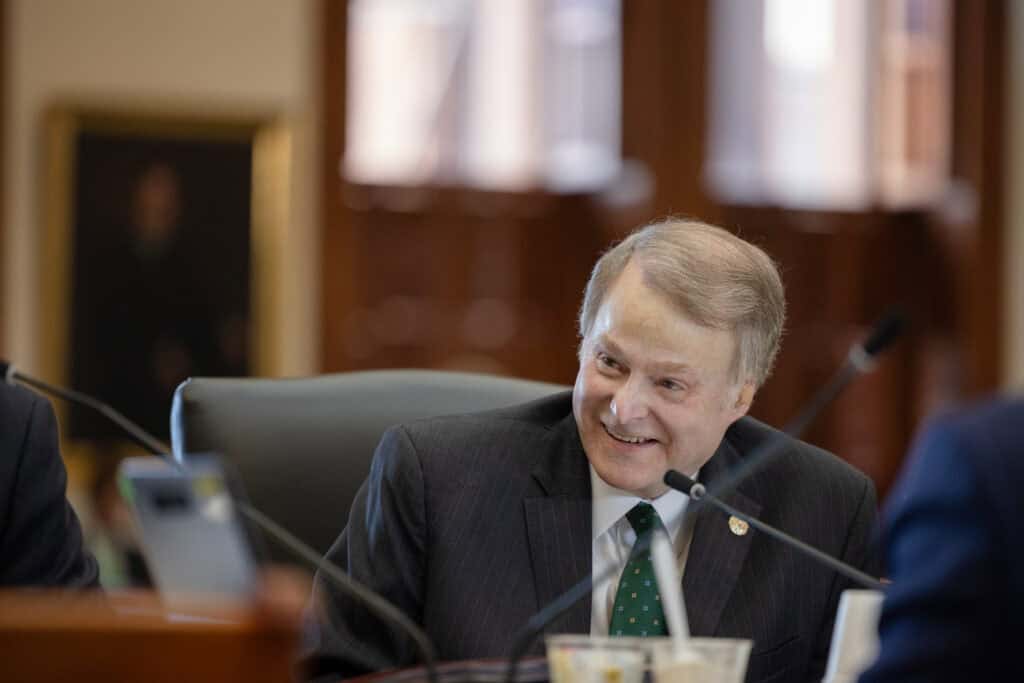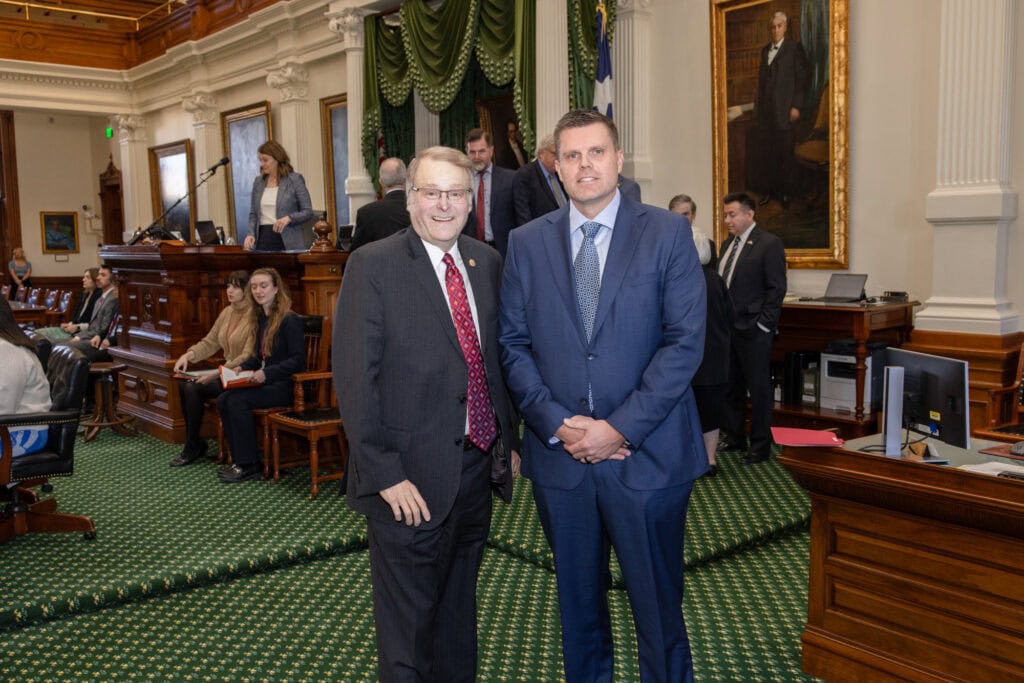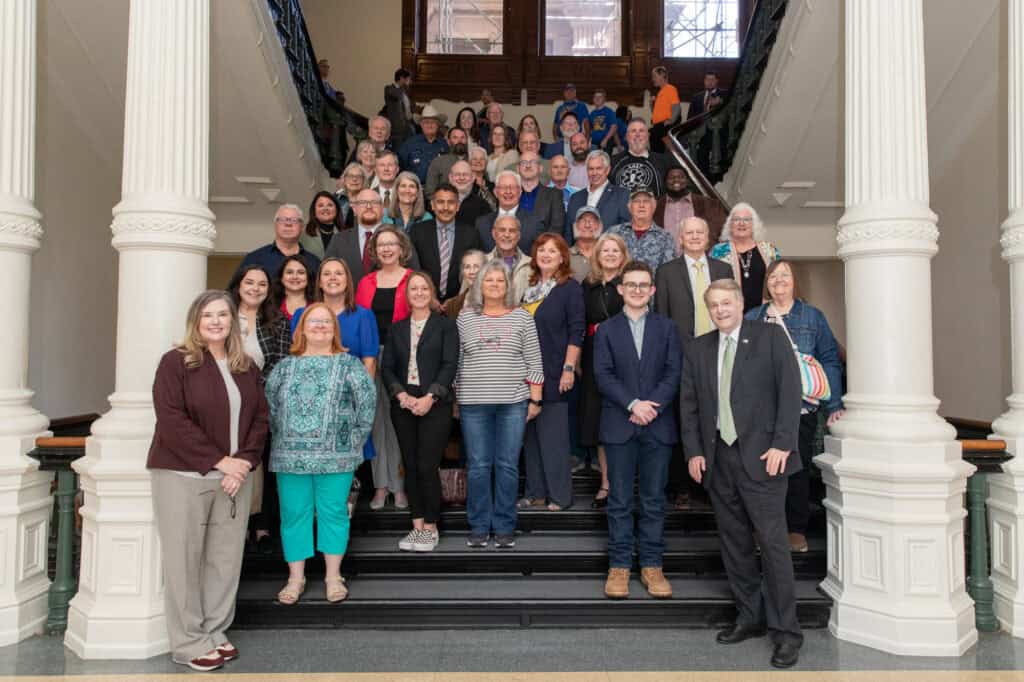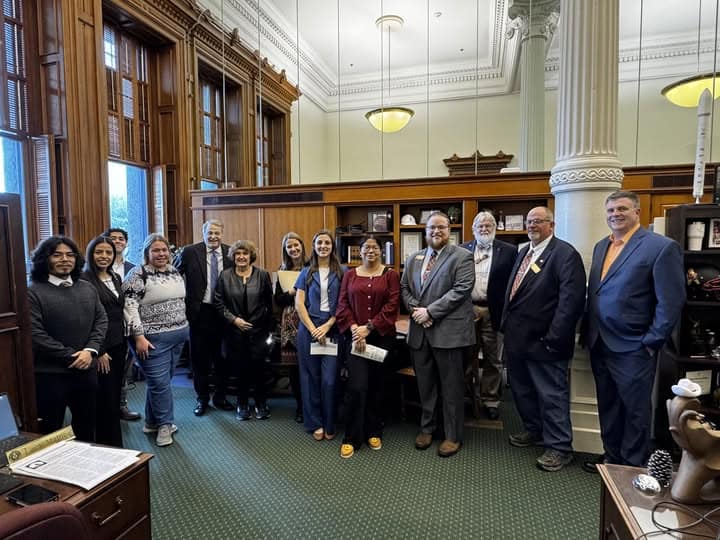Greetings from your Texas Capitol! Since our last Capitol Update, we have officially passed the constitutional 60-day threshold before which bills cannot be voted out of the Texas House or Senate without 4/5ths of the body concurring and the bill filing deadline (March 14th). I have been busy reviewing and debating a wide array of legislation, and things will only continue to ramp up. I have a good bit of information I want to share with you in this edition of the Capitol Update, so let us dive right into this edition of the update.
 Pictured here during the Senate State Affairs Committee hearing on Monday, March 17th.
Pictured here during the Senate State Affairs Committee hearing on Monday, March 17th.
Senate Joint Resolution 68 and Senate Bill 2051 (Impeachment Process Reform)
Sine my last update, I filed two of my priority bills for this legislative session, SJR 68 and SB 2051. At the end of the 2023 Legislative Session, after the Texas House of Representatives passed Articles of Impeachment to remove Texas Attorney General Ken Paxton from office, Lt. Governor Patrick named me as Chair of the Special Committee to Recommend Rules of Procedure for Court of Impeachment. In my role as Chair of this Special Committee I found the need for clarification and additional guidelines of the law governing both constitutional and statutory impeachments. SJR 68 and SB 2051 seek to fix the inadequacies identified in 2023 as well as those identified upon my continued review of impeachment law.
Impeachment is neither a criminal or a civil proceeding, but rather a delicate mixture of elements of the two within the political realm. The powers relating to impeachment are a vital check in the balances between the branches of government and are essential in keeping the sovereignty of our state and nation. According to Ferguson v. Maddox, “the primary purpose of an impeachment is to protect the state, not punish the offender.” Under Texas law, there are two types of impeachment: constitutional and statutory. Constitutional provisions regulating impeachment are direct, but lack some clarity. Constitutional impeachment, contained in Article 15 of the Texas Constitution, applies to statewide officers of the state, but Article 15 provides little to no procedural guidelines on the impeachment process. Statutory impeachment, contained in Government Code Chapter 665, applies to all other elected officials in the state and provides extensive guidelines on the impeachment process. The depth of clarity in statutory impeachment proceedings and guidelines demonstrates the need for similar guidelines for constitutional impeachments.
This lack of clarity was evidenced during the entire impeachment process of AG Paxton and shed light on insufficiencies within Constitutional impeachments. To align current law with this sentiment and address the insufficiencies identified in 2023, changes need to be made to the Texas Constitution and related statutes.
This legislative package would amend current constitutional and statutory provisions related to impeachment for all elected officials.
Most significantly, SJR 68 creates a new constitutional provision under Article XV, Sec. 7, which authorizes the Legislature to enact general laws to implement Article XV or other constitutional provisions providing for the impeachment, trial, removal from office, or disqualification of an officer of the State.
Further, SJR 68 would ensure that an impeached officer, who is suspended from their duties, will maintain their ordinary pay during the pendency of the impeachment. SJR 68 also reaffirms Sec. 16, Article IV, of the Constitution that the Lieutenant Governor will assume the duties of the Governor during the absence or impeachment of the Governor. This clarifies any question of whether the Governor can appoint his own temporary replacement if he/she is impeached.
SB 2051 amends current statute relating to impeachment proceedings by:
- Requiring that all witness testimony in an impeachment proceeding must be given under oath. This applies to both House and Senate proceedings.
- A committee considering bring articles of impeachment in the House must provide House members at least 48 hours of deliberation before the vote to recommend articles on impeachment to the full House.
- Any family member within the third degree of consanguinity or affinity of the office holder considered for impeachment is ineligible to vote in an impeachment proceeding. This applies to members of the House and Senate.
- The House and Senate are required to keep an accounting of all costs incurred by an impeachment proceeding. By the 60th day after the conclusion of an impeachment proceeding, each legislative chamber shall report those costs to appropriate state agencies.
- If the impeached office holder is the Governor or Lieutenant Governor, the Chief Justice of the Texas Supreme Court shall preside or, if they recuse themselves, the Presiding Judge of the Texas Court of Criminal Appeals.
With the catch-all provision added in SJR 68, all above changes and other statutory provisions will apply to constitutional and statutory impeachments.
The gravity of a situation such as the one we experienced in 2023, is something we should not take lightly. Such a serious power in the hands of the Legislature requires more precision than the current statute. I gave this matter, as I do my faith in the Constitutions of Texas and the United States of America, the measured consideration it deserved and I felt it prudent to bring these changes to Texas’ impeachment process.
Senate Bill 39 (Protecting Texas Trucking)
On March 13th, Lt. Gov. Patrick announced the second round of his top 40 priority bills. Amongst these, I was honored he included this legislation. SB 39 will ensure commercial motor vehicle (CMV) collision trials are focused on determining who is at fault for a collision by codifying the longstanding Admission Rule. The Admission Rule prohibits the introduction of evidence of ordinary negligent entrustment (and negligent hiring, training, supervision, and retention, to the extent those claims exist), but it does not prohibit the introduction of such evidence to prove grossly negligent entrustment. Essentially, this will tighten the shot group on the relevant admissible evidence allowed in the first phase of a trial, putting plaintiffs and defendants on an even footing to present their case.
In 2021, HB 19 (87R) aimed to curb abusive trial practices in collision lawsuits by allowing a trial to be divided into two parts, with the first part limited to evidence about the cause of the collision and the plaintiff’s compensatory damages and the second part focused on punishment of the defendants, if appropriate. A House floor amendment changed the Admission Rule, allowing some CMV owners to face negligent entrustment claims after accepting responsibility for drivers’ errors. As a result, commercial vehicle insurance rates have continued to skyrocket. Rising insurance costs combined with exorbitant settlements disrupt the state’s ability to successfully meet the supply-demand needs of all Texans. Ultimately, higher costs from litigation and insurance rates are passed through to consumers of goods and services. SB 39 fixes the 2021 change to the Admission Rule, bringing the longstanding held case law used in courts for decades into Texas statute and will prevent plaintiff lawyers from pursuing lawsuits that lack merit, which will help alleviate congestion in our courts so that legitimate lawsuits can move forward quickly in a fair and responsible manner.
Newly Authored Legislation
March 14th was the last day to file bills for the 89th Texas legislature. I filed several final pieces of legislation since the last update, including the priority ones mentioned above. Here are some examples of the legislation and all can be found online here:
SB 2049 – Currently, various aspects of childcare in Texas are overseen by multiple state agencies, including the Texas Workforce Commission (TWC), the Health and Human Services Commission (HHSC), the Department of Family and Protective Services (DFPS), and the Texas Education Agency (TEA). While each agency plays a key role in the childcare space, the lack of effective coordination means each agency is regulating that space without coordinating with each other and often results in conflicting layers of regulation that can complicate operations, driving up costs for compliance. As many childcare providers already operate on thin margins, this decentralized regulation can lead to higher tuition rates for families and fewer slots for childcare. To address these concerns, SB 2049 creates the Quad-Agency Childcare Initiative in order to require collaboration between the primary state agencies involved with childcare governance in Texas before they adopt rules and regulation for implementation. The Quad-Agency, comprising TWC, HHSC, DFPS, and TEA, is tasked with evaluating and resolving duplicative or conflicting regulations among these agencies that might impact the cost, quality, or accessibility of childcare in Texas. The Quad-Agency is not a new state agency, but a coordinating group expected to streamline regulation without increasing the scope of government. This bill is a result of the Committee’s recommendation to improving coordination across the several agencies that govern childcare in Texas.
SB 2052 – An issue of parental rights has been highlighted in Texas Supreme court case, In Re C.J.C., Relator. Traditionally, parents are presumed to be fit in making decisions in the best interest of their child. However, this is not stated in statue for modification proceedings when transferring custody of the parent’s child to a third party. The Texas Supreme Court Justices, in In Re C.J.C., Relator, ruled parents have the “fundamental right to make decisions concerning the care, custody, and control” of their child. Current statute does not conflict with this ruling, however neither is it directly stated in statute. SB 2052 codifies the Supreme Court’s ruling, and clarifies that suits by non-parents requesting custody must provide evidence that the parent is not fit. This bill reinforces the principal that the parent makes decisions that are in the best interest of the child and it is in the best interest of a child to be in the care, custody, and control of a parent.
SB 2053 – Establishes the Governors Medal of Service Award. There are similar civilian Texas awards, such as the Governor’s Medal of Courage, Governor’s Volunteer, Outstanding Women in Texas Government, Star of Texas, and Texas Women’s Hall of Fame. However, there is not an established award recognizing an individual who, through public service, exerted extraordinary service to the residents of Texas. The award would recognize an individual’s extraordinary service to the people, and body, of Texas.
SB 2199 and SB 2200 – During the Senate Committee on Border Security’s interim hearing in September of 2024, the Committee, in which I also chair, heard testimony relating to the increase in transnational criminal activity involving motor fuel and Mexican cartels, including fuel theft, overweight and off-route fuel trucks, unregulated fuel depots, and transloading operations. Law enforcement has identified not only an increase of truckers failing to adhere to their permitted overweight designated routes, but also truckers hauling loads of fuel far over the permitted weight. SB 2199 and SB 2200 are a result of the Committee’s recommendations from the interim study. Together they seek to address the dangers of these criminal enterprises by creating a criminal offense for overweight vehicles transporting hazardous material off-route and enhancing the penalty for overloading a vehicle transporting hazardous materials.
SB 2201 – With the rise of cartels and other organized criminal gangs throughout the State, the submission criteria of suspected gang members to a law enforcement intelligence database do not meet the needs of law enforcement agencies. Specifically, the rise of Tren de Aragua (TdA) has caused significant concern for all levels of law enforcement across the nation as this Venezuelan gang has proved difficult to track. SB 2201 aims to expand and revise the criteria needed by law enforcement to track individuals suspected of criminal activity in a law enforcement intelligence database as well as revise retention policies of such records. By tracking suspected criminal organization members, law enforcement officials stand a better chance to dismantle foreign terrorist organizations and other criminal gangs that pose significant risks to public safety, while protecting due process and civil liberties.
SB 2202 – Mexican cartels and foreign terrorist organizations are increasingly reliant on firearms smuggled from the U.S., especially Texas, to arm their members and operations as well as fuel their profits. Currently, federal law targets cartel members and those trafficking guns to the cartels; however, no similar statute exists in state law. Senate Bill 2202 seeks to fill this gap and provide law enforcement and prosecutors statutory language to target cartels and the trafficking of guns and prosecute those that knowingly provide or sell firearms to cartel members.
SB 2203 –The Texas Commission on Environmental Quality (TCEQ) contracts with the State Office of Administrative Hearings (SOAH) to conduct administrative hearings. An administrative law judge (ALJ) presides over these hearings and makes decisions forwarded to the TCEQ Commissioners who will either adopt, amend, or deny them. ALJs have the option to take discovery related questions to the Commissioners, but do not have to do so. This authority can lead to inconsistent decisions. This bill would mandate the SOAH ALJ to promptly refer scope of discovery issues that are brought by protestants or applicants to the Commissioners for interpretation. Achieving consistency with TCEQ requirements ensures environmental and public health benefits are realized, provides certainty and predictability to protestants and applicants, and helps ensure TCEQ-related statutes, rules, and guidance are applied consistently, not just in district courts, but in our administrative courts as well.
SB 2784 – Somervell County’s initial election when the Somervell County Hospital District was created, the proposed staggered terms of the board’s membership became uneven due to a tie vote between the fourth and fifth top vote getters. As a result of this uneven staggering of terms election cycle and the two-year terms of the board members, it has become difficult for the board to have time to learn about the hospital district’s operations and provide for continuity of oversight. The Somervell County Hospital District passed a resolution in November of 2024 to increase the term length and address these issues. This legislation would alter the election cycle, providing more staggered terms while moving them to the uniform election date in May, and increase the term length to four-year terms for the Somervell County Hospital District board members.
UPDATE: The 2026-2027 State Budget
On Tuesday, your Texas Senate unanimously approved Committee Substitute to Senate Bill 1 (CSSB 1) by Senator Joan Huffman (R-Houston), establishing the Senate-proposed version of the Texas state budget for the next two years. CSSB 1 establishes a $336.06 billion “All Funds” (state and federal funds combined), including $153.5 billion in General Revenue (state funds only) for the Fiscal Year 2026-2027 biennium budget, which is well within the state’s “population growth times inflation” metric and our constitutional spending limit. I am continually humbled to have seen the incredible amount of work that Chairwoman Huffman, the committee members, the Legislative Budget Board, and all associated staff members collectively put into the budgeting process. I have heard from constituents on a wide variety of budgetary items and each has been considered carefully in what was an unexpectedly difficult budget cycle. The bill remains a working document, and now will go to the House. The process of the budget is fluid and I will continue to work to meet the priority needs of our state to keep Texas moving in the right direction. I look forward to providing more detailed updates on the bill as we continue through the legislative process. For now, here are a few highlights in the bill as passed by the Senate:
- $70.9 billion in All Funds, an increase in $11.3 billion, to fully fund the Foundation School Program along with additional money for school safety and special needs students;
- $6.115 billion to provide significant pay increases for Texas educators;
- $6.4 billion for state’s contribution to retirement benefits at the Teacher Retirement System (TRS) and $1.2 billion to provide for the state’s contribution to TRS-Care;
- $6 billion in property tax relief: $3 billion to further compress school district M&O tax rates under HB 3 (86R) provisions, $3 billion to raise the homestead exemption from $100,000 to $140,000, and $500 million to provide tax relief to businesses (This assumes $51 billion in property tax relief since 2019);
- $850 million for career and technical education programs at Texas State Technical Colleges (from my SJR 59 described in March 5th Capitol Update);
- $304 million for Graduate Medical Education Expansion, including a new $71 million to maintain the state 1.1:1 ratio of available slots per graduate, to keep Texas medical schools graduates practicing in Texas:
- $75 million for the Rural Hospital Grant program, including $25 million for essential access grants that may be used to recruit and retain physicians and nurses in rural areas;
- An additional $5 billion to fully realize $10 billion in planned appropriations from last session for the Texas Energy Fund to incentivize construction of firm, dispatchable power plants to ensure longterm reliability and resilience of the state’s power supply;
- $2.5 billion for water infrastructure and the development of new water sources to get water to where supply is needed;
- Nearly $143 million to act as a state match for federal funds through the Clean Water and Drinking Water State Revolving Fund;
- $10 million for the Texas Ranger’s F-Troop portion of the redevelopment of the Texas Ranger Hall of Fame and Museum by the City of Waco and the Texas Rangers Foundation. F-Troop is currently housed in the same building as the Hall of Fame museum in Waco, which is being moved due to current space restrictions and lack of ability to expand;
- Continues to fund border security at current levels;
- Provides funding for almost 600 new DPS troopers to serve across our state;
- Provides funding for 550 new staff to improve customer service at Driver License offices around the state.
Joint-Authored & Co-Authored Bills
As always, I welcome the opportunity to lend my signature and support to colleagues who are filing quality legislation as a Joint Author/ Co-Author, some of these are below, and a full list can be found here.
SB 12 (Bettencourt) – SB 12 establishes a Parental Bill of Rights. This will reassert parents as the primary decision-makers in their child’s public school education by eliminating discriminatory Diversity, Equity, and Inclusion (DEI) ideology in public schools, restricting teachings of sexual orientation and gender identity, simplifying public school transfers, and shortening the parent-ISD complaint process. Provisions of SB 12, if signed into law, take effect for the 2025-2026 school year. This bill passed the full Senate on March 19th.
SB 20 (Flores) – Will create a new state felony offense for the possession or promotion of obscene visual material that appears to depict a child younger than 18 years old, regardless of whether the depiction is of an actual child, cartoon or animation, or an image created using AI or other computer software. This bill passed the full Senate unanimously on March 12th.
SB 25 (Kolkhorst) – This bill would require food labels to warn Texas consumers which ingredients are banned in other countries starting in 2027. SB 25 also requires daily physical education for students from kindergarten to eighth grade and prohibits the removal of recess, physical education, and sports practice for disciplinary reasons. Additionally, the bill requires nutrition education for students in Texas high schools and institutions of higher learning, along with updated nutrition training for all Texas physicians, medical residents, nurses, physician assistants, and medical students. SB 25 will also establish a nutrition advisory council at the Department of State Health Services with a focus on metabolic health, functional medicine, and chronic disease. This bill passed the full Senate unanimously on March 12th.
SB 75 (Hall) – Will create the Texas Grid Security Commission (TGSC) under the direction of the Texas Department of Emergency Management (TDEM) to evaluate all hazards to the ERCOT electric grid and vulnerabilities of essential service systems for municipalities.
SB 260 (Huffman) ⸻ This bill will permanently increase state spending on school safety by an additional $500 million for the next biennium. This legislation also doubles the annual funding for each campus from $15,000 to $30,000, which nearly triples the per-student funding from $10 to $28 each year. This funding is in addition to the existing $366 million allocated for ongoing support for public schools, as well as the $1.1 billion designated for school hardening grants from the last legislative session. This bill passed the full Senate unanimously on March 12th.
 Was happy to have Pastor Justin Coffman from Harvest Hill Church in Midlothian (where he also serves as Mayor!) as the “Pastor of the Day” in the Senate last week.
Was happy to have Pastor Justin Coffman from Harvest Hill Church in Midlothian (where he also serves as Mayor!) as the “Pastor of the Day” in the Senate last week.
Other key Issues Passed out of Senate
In addition to the bills discussed above; here are a few other key pieces of legislation that have passed the Senate in recent weeks. Those include:
- SB 10 (King) – Requires public school classrooms to display a copy of the Ten Commandments. This legislation passed the Senate last session, but died on the House floor.
- SB 11 (Middleton) – Establishes a framework that a school district or open-enrollment charter school may use when establishing a policy to provide students and employees the ability to participate in a period of prayer and reading of religious texts. Employees or a parent or guardian of the students participating would need a signed consent form and would have a choice to participate. Proud to have Joint-Authored this bill.
- SB 17 (Kolkhorst) – Prohibits the purchase of certain private property (agricultural land, an improvement on agricultural land, commercial property, industrial property, residential property, a mine or quarry, a mineral in place, or standing timber) in Texas by governmental entities, companies, and individuals that are domiciled in Russia, North Korea, China, and Iran. These prohibitions do not apply to United States citizens and lawful permanent residents, including dual citizens. Proud to have Joint-Authored this bill, as well.
- SB 293 (Huffman) – This bill aims to improve Texas’ judiciary by expanding the definition of judicial misconduct and enhancing the complaint process against judges. SB 293 will require quarterly reporting of district judges’ duties to ensure greater public knowledge of judicial workloads. The bill also increases base pay for district judges.
Capitol Visits from SD-22
I have enjoyed the honor of welcoming numerous constituents and elected officials from Senate District 22 at the Capitol! Since the last Capitol update we’ve hosted citizens from Arlington, Waco, Granbury, Midlothian, Clifton, Red Oak, and Stephenville, as well as County Days for Ellis, Hill, and McLennan Counties, all who made the trek to Austin in the last few weeks to learn about the legislative process and voice their questions and concerns about Texas public policy. It is always my pleasure to see them and answer their thoughtful questions about the work of the Legislature, and to visit about the direct impact our work will have on them, the citizens we serve.


Above left, I was excited to have a delegation in town for Ellis County Day at the Capitol; Above right, Pictured here with Sheriff Pounds of Comanche County who was visiting for Sheriffs’ Association of Texas Day at the Capitol; Below left, Hill County brought in a large delegation for their County Day, I was happy to get to visit with them and present a resolution on the Senate floor; Below right, Happy to have got to see Dr. McKown, her team, and students from McLennan Community College in my Capitol office.


As always, I want to thank you again for reading this update from ‘Team Birdwell.’ I hope you found it informative and that you’ll share it with your friends, family, and colleagues in Senate District 22, who may subscribe to the Capitol Update by clicking here. If you missed any of my previous Capitol Updates and want to read them too, you can find them here!
God bless,

Brian Birdwell
State Senator, District 22
Austin: (512) 463-0122 // Waco: (254) 776-6225 // Arlington: (817) 466-7327 // Granbury: (817) 573-9622
[email protected] // www.senate.texas.gov
